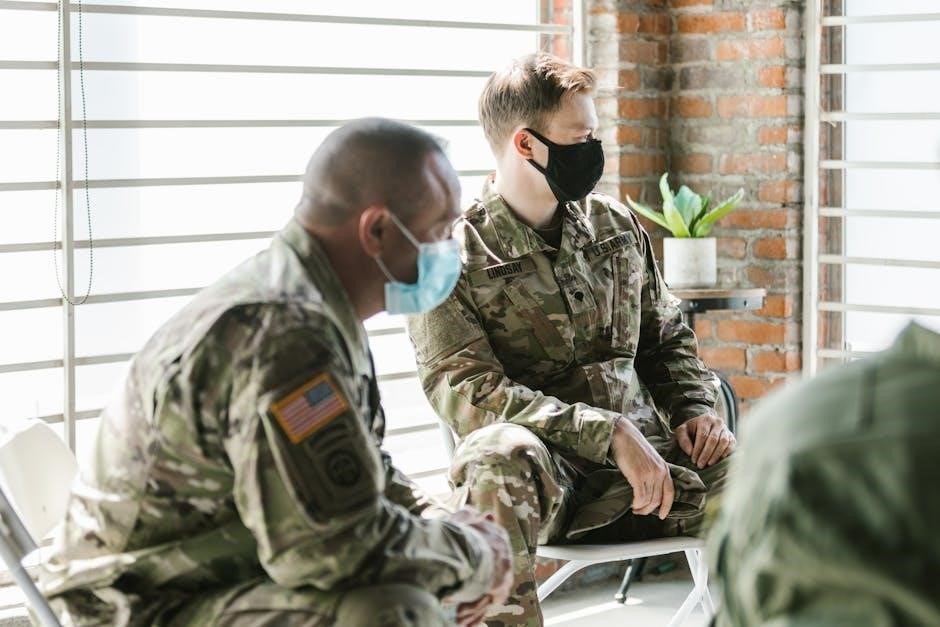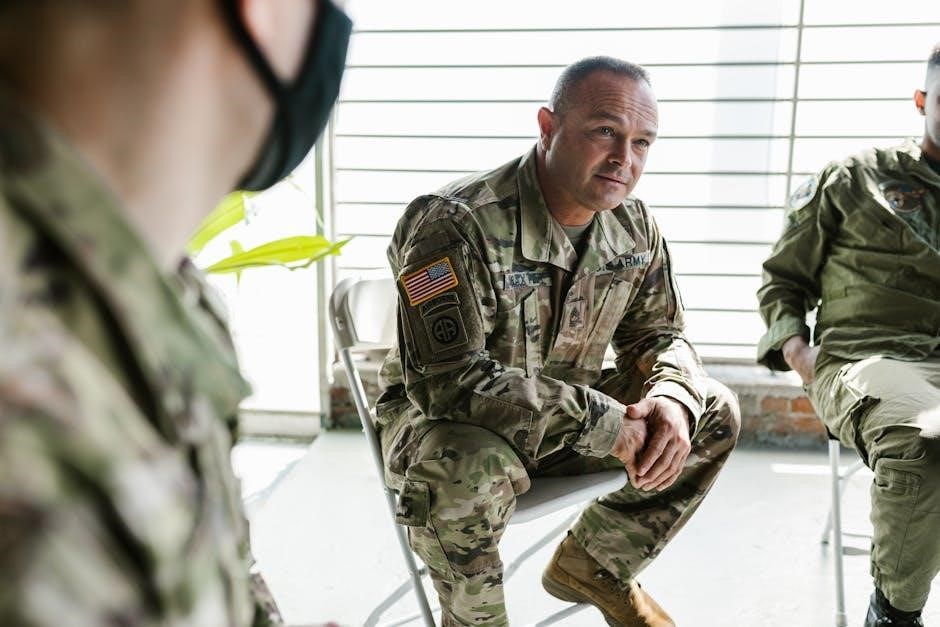Counseling chits are formal tools used by the Navy to document and address performance or conduct issues․ The NAVPERS 1616/25 form is central to this process, ensuring clear communication and accountability․ These documents serve as both corrective and developmental resources, fostering improvement and adherence to naval standards․ They are essential for maintaining discipline, promoting growth, and ensuring legal compliance in military operations․
Overview of Counseling Chits
Counseling chits are formal documents used in the Navy to address performance, conduct, and developmental issues․ The NAVPERS 1616/25 form is a key tool, documenting evaluations, disciplinary actions, and corrective measures․ These chits facilitate open communication between sailors and superiors, providing constructive feedback and setting clear expectations․ They serve as both corrective and developmental resources, ensuring sailors understand their responsibilities and areas for improvement while maintaining accountability and adherence to naval standards․
Importance of Counseling in Naval Operations
Counseling is vital in naval operations for maintaining discipline, improving performance, and ensuring mission readiness․ It provides a structured approach to addressing deficiencies, fostering personal and professional growth․ Through counseling, sailors receive clear expectations and constructive feedback, enabling them to correct issues and meet standards․ Effective counseling strengthens unit cohesion, accountability, and overall operational effectiveness, making it a cornerstone of naval leadership and development․

The Purpose and Function of Counseling Chits
Counseling chits document performance issues, corrective actions, and accountability, ensuring legal and administrative compliance while fostering improvement and maintaining naval standards and operational readiness․
Official Forms and Documentation
The primary form used for counseling in the Navy is the NAVPERS 1616/25, also known as the Record of Enlisted Counseling․ This form is utilized to document both positive and negative counseling sessions, ensuring accountability and adherence to naval policies․ It serves as a formal record of performance evaluations, disciplinary actions, and corrective measures․ Proper documentation is critical for maintaining legal and administrative compliance, and the form must be completed accurately to reflect the specifics of each counseling session․ Additionally, the MILPERSMAN 1910-202 provides the governing policies for these procedures, ensuring consistency across the fleet․ Counseling records are securely stored to maintain confidentiality and are accessible for future reference or required reviews․
Legal and Administrative Significance
Counseling chits hold significant legal and administrative weight in the Navy, as they are formal records used in disciplinary and performance-related decisions․ The Privacy Act Statement ensures the confidentiality of these documents, while their legal authority is derived from 5 U․S․C․ sec․ 301, 10 U․S․C․ 5947, 44 U․S․C․ sec․ 3101, and Executive Order No; 9397․ Proper documentation is essential for accountability and may be used in legal proceedings or command decisions․ Refusal to sign a chit can lead to administrative consequences, emphasizing the importance of understanding and adhering to these protocols․

Structure and Components of a Counseling Chit
A counseling chit typically includes the service member’s information, counselor details, a description of the issue, corrective actions, and signatures․ The NAVPERS 1616/25 form outlines these components, ensuring clarity and completeness in documentation․
Key Sections of the NAVPERS 1616/25 Form
The NAVPERS 1616/25 form includes essential sections such as the service member’s personal information, counselor details, a detailed description of the issue, corrective actions, and signatures․ It also outlines the plan for improvement, ensuring accountability and clarity․ This structured format guarantees that all necessary information is captured, facilitating proper documentation and adherence to naval protocols․ The form’s design ensures legal and administrative compliance, making it a vital tool for addressing performance and conduct matters effectively․
Step-by-Step Guide to Completing the Form
Begin by filling in the service member’s personal details, including name, rank, and ID number, followed by the date of the counseling session․ Clearly describe the issue or behavior requiring attention, ensuring specificity․ Outline the expected corrective actions and a plan for improvement, developed jointly with the member․ Obtain signatures from both the counselee and counselor, acknowledging the discussion․ Finally, document any follow-up actions and store the form securely, maintaining confidentiality as per Navy regulations․ This ensures accountability and proper documentation․

Counseling Policies and Procedures
Counseling policies and procedures in the Navy are governed by MILPERSMAN 1910-202, which outlines guidelines for addressing substandard performance and conduct issues․ Counseling chits are used to correct deficiencies and promote improvement, ensuring adherence to naval standards and fostering a culture of accountability and growth․
MILPERSMAN 1910-202 Guidelines
MILPERSMAN 1910-202 establishes policies for counseling and rehabilitating Navy personnel with substandard performance or conduct․ It applies to all active-duty and reserve personnel, ensuring consistent corrective actions․ Commanding officers must provide opportunities for improvement before administrative separation․ Counseling chits are used to document these efforts, focusing on specific issues and corrective plans․ This regulation emphasizes the importance of fair treatment, accountability, and support for sailors to meet expectations and maintain operational readiness․ It ensures a structured approach to addressing deficiencies while safeguarding individual rights․
Command Responsibilities and Procedures
Commanding officers are responsible for ensuring counseling sessions are conducted fairly and documented accurately․ They must follow established protocols, maintain confidentiality, and provide clear feedback․ Commands should use official forms like the NAVPERS 1616/25 to record counseling details․ Regular follow-ups are required to monitor progress and ensure corrective actions are taken․ Commands must also provide resources and support to help sailors improve․ Proper documentation and adherence to guidelines ensure accountability and fairness throughout the counseling process․

Types of Counseling in the Navy
Navy counseling includes positive and negative types, addressing commendable performance or corrective actions․ It also distinguishes between non-punitive and punitive counseling, reflecting the nature of the discussion and outcomes․
Positive vs․ Negative Counseling
Positive counseling recognizes and reinforces exemplary performance, encouraging continued excellence․ It sets clear goals and expectations, fostering a motivational environment․ In contrast, negative counseling addresses substandard behavior or performance, providing corrective feedback and outlining specific improvements needed․ Both types are documented formally, ensuring accountability and growth․ Understanding these distinctions is crucial for effective communication and development within the Navy’s structured framework․
Non-Punitive vs․ Punitive Counseling
Non-punitive counseling focuses on correcting deficiencies without formal disciplinary actions, aiming to rehabilitate and improve performance․ It emphasizes personal growth and is often used for minor issues․ Punitive counseling, however, is more formal and may involve disciplinary measures, such as letters of instruction or reprimand․ This type addresses serious misconduct and serves as a record for potential administrative actions․ Both approaches are essential for maintaining accountability and supporting sailors’ development within the Navy’s framework․

Preparing for a Counseling Session
Research policies, understand counseling types, prepare documentation, and plan discussions․ Ensure compliance with MILPERSMAN 1910-202 guidelines to address performance issues effectively and fairly, fostering constructive dialogue and growth․
Pre-Counseling Checklist
Review MILPERSMAN 1910-202 guidelines, prepare the NAVPERS 1616/25 form, and gather relevant documentation․ Identify specific issues to address, plan discussion points, and establish clear goals․ Ensure privacy and confidentiality, creating a respectful environment for open dialogue․ Confirm the attendee’s understanding of the process and their rights․ This structured approach ensures effective communication and adherence to Navy protocols, fostering productive counseling sessions․
Setting the Right Environment for Effective Communication
Creating a private, respectful, and non-confrontational setting is essential for effective counseling․ Ensure minimal interruptions, active listening, and a focus on the individual․ A neutral and comfortable environment fosters openness, allowing sailors to express concerns freely․ Demonstrating empathy and understanding builds trust, encouraging honest dialogue․ This approach aligns with MILPERSMAN 1910-202 guidelines, promoting constructive communication and fostering personal and professional growth within the Navy․

Documenting Counseling Sessions
Accurate and timely documentation is crucial․ Use official forms like NAVPERS 1616/25 to record counseling details, ensuring clarity and accountability․ Maintain confidentiality and store records securely, adhering to Navy policies․
Best Practices for Recording Counseling
For effective counseling documentation, ensure clarity and accuracy․ Use the NAVPERS 1616/25 form to record details, focusing on specific behaviors or performance issues․ Be objective, factual, and concise․ Include actionable steps for improvement and the counselee’s input․ Ensure signatures and dates are included for accountability․ Follow MILPERSMAN 1910-202 guidelines to maintain consistency and legal compliance․ Store records securely to protect privacy and confidentiality, adhering to Navy policies and procedures․
Storage and Confidentiality of Counseling Records
Counseling records must be stored securely to protect privacy․ Ensure documents are kept in designated, access-controlled areas․ Limit access to authorized personnel only․ The Privacy Act Statement governs the handling of these records, ensuring confidentiality․ Unauthorized disclosure is prohibited and may result in legal consequences․ Proper storage and handling are critical to maintaining trust and adhering to naval regulations․ Always follow established procedures for safeguarding sensitive information․

Legal and Ethical Considerations
Counseling chits are legally binding documents requiring adherence to ethical standards․ The Privacy Act Statement ensures confidentiality, while refusal to sign may lead to disciplinary actions․ Understanding legal obligations is crucial for maintaining integrity and fairness in the counseling process, respecting service members’ rights and promoting just practices within the Navy․
Privacy Act Statement and Rights
The Privacy Act Statement on counseling chits ensures personal information is protected under federal law․ Service members’ rights include knowing the purpose of data collection and its use․ Refusal to sign a chit doesn’t waive these rights, but consequences may follow․ The Navy must comply with legal standards, ensuring transparency and accountability while safeguarding privacy․ This balance upholds ethical practices and respects sailors’ rights during the counseling process․
Consequences of Refusing to Sign a Counseling Chit
Refusing to sign a counseling chit does not negate its validity but may result in further administrative or disciplinary actions․ Commanders may note the refusal in records, potentially impacting performance evaluations or career advancement․ While service members retain their rights under the Privacy Act, non-compliance can escalate issues and demonstrate unwillingness to address concerns․ Signing acknowledges receipt, not guilt, and is a procedural step to ensure awareness of expectations and corrective measures; Refusal may strain relationships with command and hinder resolution of underlying issues․

The Future of Counseling in the Navy
The Navy is evolving counseling practices through digital tools and modern approaches, enhancing documentation efficiency and fostering a more proactive, supportive environment for personnel development and accountability․
Modern Approaches to Counseling
The Navy is adopting innovative counseling methods, shifting from traditional forms like the NAVPERS 1616/25 to digital tools and platforms․ This transition streamlines documentation and enhances accessibility, ensuring consistent and efficient counseling practices across commands․ Modern approaches emphasize proactive communication, personalized development plans, and real-time feedback to address performance issues effectively․
These advancements aim to foster a supportive environment, promoting growth and accountability while aligning with the Navy’s commitment to technological integration and improved personnel management․ Digital solutions are expected to play a key role in shaping the future of naval counseling practices․
Technological Advancements in Counseling Documentation
The Navy is integrating digital platforms to modernize counseling documentation, enhancing efficiency and accessibility․ Electronic forms and centralized databases streamline the process, reducing paperwork and improving record-keeping․ These tools enable real-time updates, secure storage, and easier retrieval of counseling records․ Digital solutions also promote consistency, ensuring all personnel adhere to standardized procedures and guidelines․
This shift supports the Navy’s goal of transparency and accountability, fostering a more organized and tech-savvy approach to counseling and documentation․
Counseling chits are essential for maintaining Navy standards, fostering accountability, and promoting personal growth․ They ensure effective communication and documentation, supporting sailors’ development and operational excellence․
Final Thoughts on Effective Counseling Practices
Effective counseling practices are vital for fostering accountability, growth, and operational excellence in the Navy․ Counseling chits, like the NAVPERS 1616/25, ensure clear communication and documentation, helping sailors understand expectations and improve performance․ They also provide a legal framework for addressing issues while protecting service members’ rights․ By adhering to established guidelines, such as those in MILPERSMAN 1910-202, commanders can promote a culture of transparency and development․ Counseling chits remain a cornerstone of Navy personnel management, adapting to modern challenges while maintaining their core purpose of fostering excellence and accountability․